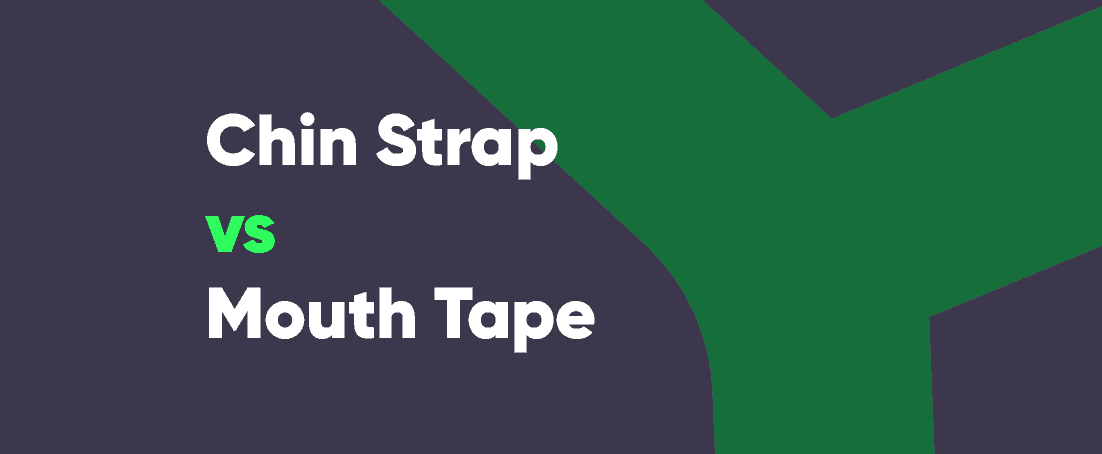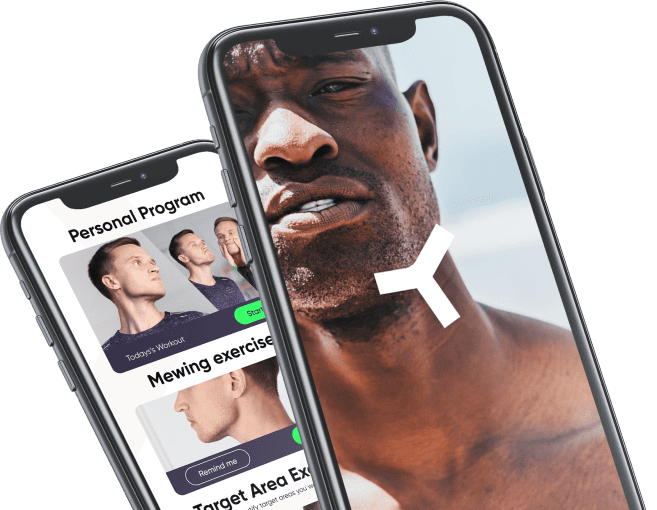
Snoring, allergies, and sleep apnea plague countless people and their partners. These nighttime disturbances commonly arise from mouth breathing and may not only erode the quality of sleep but also contribute to long-term health issues, leaving sufferers searching for effective solutions.
Chin straps and mouth tapes offer a welcome respite for those unwilling to invest in more bulky and expensive equipment like CPAP machines. The online consensus often tilts in favor of using a tape. I’ve put both options to the test to figure out whether this is true.
This article offers my research findings and personal experience to help you decide which of these solutions is worth your money the most.
Benefits of Mouth Taping?
Taping your mouth involves the simple yet slightly odd practice of sealing your mouth shut with specialized tape during sleep. It might look peculiar at first glance but it serves a highly functional purpose. The tape forces you to breathe through your nasal airways, leading to several health benefits that could significantly improve your sleep and overall health.
Mouth taping is more than a bizarre nighttime routine. Its science-backed benefits contribute to improved sleep quality and reduced snoring, enhancing overall mouth health and hygiene in the process. I can vouch for these benefits as I have experienced them first-hand while looking for the best mouth tape for snoring.
Promotes Nasal Breathing and Reduces Snoring
Taping your Mouth encourages nasal breathing, a critical aspect of healthy respiration. Breathing through the nose filters and humidifies the air, removing particles and pathogens that could otherwise cause irritation or infection.
During my trial of mouth taping, I found a noticeable increase in my mood after I rise from the bed. This might be due to increased oxygen levels and decreased apnea during the night.
Snoring occurs mainly due to mouth breathing when you sleep. Snoring vibrates and stresses the soft tissues in the throat, contributing to sleep disruptions. Nose breathing mitigates this by redirecting the airflow, making your sleep quieter and less interrupted. My spouse confirmed that I haven’t snored at all while using mouth tapes.
Enhances Sleep Quality
Sleep quality matters just as much as sleep duration. Taping your mouth encourages deeper sleep stages, particularly REM sleep, which is crucial for cognitive function and memory consolidation. This is because breathing through your nose produces nitric oxide, a molecule that plays an essential role in opening up your airways and enhancing oxygen exchange in the lungs.
I observed that after a week of consistent mouth taping, my sleep felt more restorative. I woke up more refreshed, a sure indicator that the quality of my sleep had improved. Even after stopping to use tape after some time, I still felt the benefits as the habit of breathing through my nose became less prevalent.
Improved Oral Health
Using a mouth tape can not only increase your energy levels by promoting nasal airway use but also improve your oral health. This is because when you breathe through your mouth, it tends to get dry. This leads to conditions for various bacteria to form and bad breath to appear.
Other appliances, such as CPAP machines or mouth guards, can also achieve this purpose. However, in most cases, it’s an effective measure that prevents sleep more than it improves your mouth and nasal hygiene.
Reasons to Avoid Using a Mouth Tape?
Despite the numerous sleep benefits I’ve experienced, and many others report, it’s essential to acknowledge that mouth taping is not universally suitable. There are specific scenarios where its application should be reconsidered, primarily because of discomfort and potential skin sensitivities. It often happens with an appliance meant for a different purpose, such as surgical tape or a nasal strip.
Discomfort
While mouth taping encourages nasal breathing, it can become a source of discomfort for some people. Anyone with existing respiratory issues like nasal polyps or obstructed breathing should proceed with caution. The tape may exacerbate feelings of breathlessness, although these cases are relatively rare.
I felt a slight discomfort initially but adapted quite quickly. This might not be the case for everyone and some might take a longer time to get used to nasal oxygen intake. However, if mouth tape is too uncomfortable for some people, then the mild OSA treatment with CPAP will be even worse.
Skin Sensitivity and Allergies
People with sensitive skin or specific allergies should also be cautious of getting their mouth taped. The adhesive used in mouth tapes could irritate the skin, leading to redness or itching.
This side effect is usually more of an inconvenience than a serious concern, but it’s worth noting. While testing mouth tapes, I did not experience any adverse skin reactions, but it’s reasonable to assume others might not be as fortunate.
Mouth-taping offers significant advantages, including the ones I’ve personally verified, but it’s crucial to approach its usage with caution. Pay attention to your body’s signals, especially if you have pre-existing health conditions that could interact adversely with this sleep aid method. If you feel any risks, don’t get your mouth taped and consult a healthcare provider.
Benefits Of Using Chin Straps?
Chin straps are fabric bands worn around the head and under the jaw to support the chin and help keep the mouth closed. While many people associate chin straps solely with nighttime use to aid in sleep quality, they are also employed during the day for medical purposes, such as aiding postoperative recovery from jaw surgeries.
Historically, the use of chin straps to address sleep issues traces back to their application in treating temporomandibular joint disorders, commonly known as TMJ. But when we compare a sleeping chin strap with nasal strips or tape for the mouth, we can see the benefits of adjustability and improved sleep patterns.
Adjustable
Unlike mouth tape, which adheres directly to the skin, chin straps can be adjusted to suit individual comfort levels and sleep habits. This is particularly beneficial if you have concerns about feeling restricted. During my time testing chin straps, I appreciated the ability to control the tension, ensuring it was snug but not suffocating.
Reduced Disruption to Sleep Patterns
The straps assist in keeping the mouth closed and promoting nasal breathing, which helps to improve your sleep quality. By maintaining a stable position throughout the night, chin straps help create uninterrupted sleep cycles. This, in turn, enhances both the depth and duration of restorative sleep stages, positively impacting overall health.
Reduces Snoring
As with mouth tape or mouth guard, straps promote oxygen intake through nasal airways, meaning that there are no vibrations in your throat that cause snoring. Some difficult apnea patients are even snoring with CPAP machines, making them less effective in treating apnea sleep disturbances. In such cases, a chin strap might be the only option to start using the nasal airways while you sleep.
Reasons to Avoid Using a Chin Strap?
While I found a chin strap for the mouth to be beneficial, my experience led me to prefer a mouth tape when I sleep. For some individuals, such as myself, chinstraps are not the most effective or comfortable long-term solution to embrace nasal oxygen intake, reduce snoring, and fight apnea symptoms.
Limited Effectiveness for Certain Issues
Chin straps chin straps are not a solution for most patients with very severe sleep apnea. While they can assist in keeping the mouth closed, they don’t necessarily provide the kind of airway support needed to address more complex breathing issues. Mouth tapes are better in this regard as some of them do not cover the mouth entirely allowing you to still breathe.
My own experience and research of user feedback confirm this observation, indicating a narrower scope of effectiveness for chin straps. Essentially, you need something like a CPAP to get the best of a chin strap.
Of course, the experience may vary depending on your condition and comfort levels. For example, if you are a calm sleeper, a chin strap will be better for you, but mouth tape may be more effective for someone who tosses and turns a lot. Similarly, a CPAP machine will not be an option as well.
Dependency and Long-Term Use
Chin straps can be uncomfortable to wear for extended sleep periods, potentially causing skin irritation or rashes around the mouth. While I experienced minor mouth discomfort, others might find these issues more bothersome.
Additionally, with repeated use, some people may find it difficult to sleep without the chin strap, causing unnecessary reliance on an external aid. This is less likely to happen if you use a tape.
Factors Influencing Your Choice
It’s crucial to understand your own body and the specific conditions that contribute to your sleep disturbances before purchasing any appliance. So start by listening to your body to figure out your needs and possible side effects that you might be susceptible to.
I have summarized some of the research about using a mouth tape or a chin strap to treat sleep disorders below.
Advice From Healthcare Professionals
According to medical professionals, mouth taping may be beneficial for reducing snoring and tiredness in people with obstructive sleep apnea. It can also be useful in preventing air leaks for those CPAP users. However, the scientific community does not universally recommend mouth taping for sleep disorders due to insufficient studies on the topic.
So, you should proceed with caution and not risk preventing yourself from taking deep breaths during sleep at night if your condition requires it. On the other hand, there are studies showing using a mouth tape or a chin strap is a great supplementary measure against apnea and snoring.
For example, a chinstrap for mouth is commonly prescribed for obstructive sleep apnea patients who require positive airway pressure therapy. Importantly, the effect of chin strap is useful in supplementing but not replacing CPAP therapy according to some scientific studies.
Both tape and chin strap have their advantages and limitations for mouth health. Neither is a one-size-fits-all solution, and both come with exceptions. So, as you weigh the pros and cons of each method, remember that individual needs and conditions should guide your decision, alongside the insights from medical research and healthcare professionals.
User Experience
Users of mouth tapes often report improvements in snoring, concentration, and even bad breath. During my review, I found that a tape indeed enhances oxygen intake by encouraging nasal breathing, thereby reducing snoring considerably. However, caution is advised as long-term use may pose some risks. Most notably, clogged nasal passages and skin irritation.
As for chin straps, customer reviews generally indicate a comfortable fit and better efficacy of CPAP machines. My personal experience aligns with this, adding that while chin straps don’t necessarily reduce snoring, they do assist with oxygen intake. However, some users have reported discomfort and skin irritation, which I also found to be an issue.
As you can see, my testing of mouth tapes and chin straps showed individual benefits and disadvantages. Personal preferences, medical conditions, and consultation with healthcare professionals should also be included in your decision-making.
Comfort
Most of the reviews online and my own experience lean towards mouth tapes being more comfortable to sleep with.
Applying a mouth tape takes mere seconds and requires no elaborate fitting, unlike a chin strap that often necessitates adjustments and potentially covers half of your face. My experience with a tape confirms this: I simply attached the tape and drifted off to sleep, barely conscious of its presence.
Another major comfort factor is the absence of pain points. Chin straps tend to exert pressure on various parts of the face and jaw, which can lead to discomfort and even skin irritation. In contrast, a good-quality mouth tape adheres to the skin without causing irritation, provided you’re not allergic to the adhesive.
In my tests, I never encountered issues with skin irritation from mouth tapes, but I did feel the skin around my jaw and mouth after wearing a chin strap.
If you’re looking for a less intrusive, more straightforward solution that minimizes discomfort, tapes are the superior option. Their ease of use and limited contact area reduces the likelihood of skin issues and discomfort, making them a clear winner in the comfort department.
Severity Of Mouth Breathing Issue
The main objective of every mouth tape is to train the body to rely on nasal breathing, which is biologically more effective for oxygen intake. I have found that mouth tapes provide an immediate solution by sealing the lips, forcing you to breathe through your nose and thereby mitigating the drawbacks of mouth breathing, such as dry mouth and snoring.
Nasal breathing is the body’s natural and optimal way of inhaling and exhaling air. It not only filters out impurities but also promotes diaphragmatic breathing, enabling a more efficient gas exchange in the lungs. My experience aligns with this: When using mouth tapes, my sleep quality improved markedly, and I woke up feeling more refreshed and less fatigued.
Chin straps, while beneficial in some ways, do not have the same targeted focus on discouraging mouth breathing. A chin strap keeps the mouth closed but can’t always prevent air from escaping through slightly parted lips. During my experimentation with a chin strap, I noted that they could not guarantee a fully sealed mouth, especially if I shifted a lot during sleep.
Chin Strap vs Mouth Tape: Final Verdict
Addressing the issues of snoring, sleep apnea, and mouth breathing requires a nuanced approach. Both chin straps and mouth tapes have merits, but my experience and research led me to favor a tape for its superior comfort and effectiveness in promoting nasal breathing.
While neither solution will suit everyone, mouth tapes emerge as the more straightforward and effective option for tackling severe mouth breathing issues. Since they do not cost much, I suggest simply trying them out and seeing for yourself.



